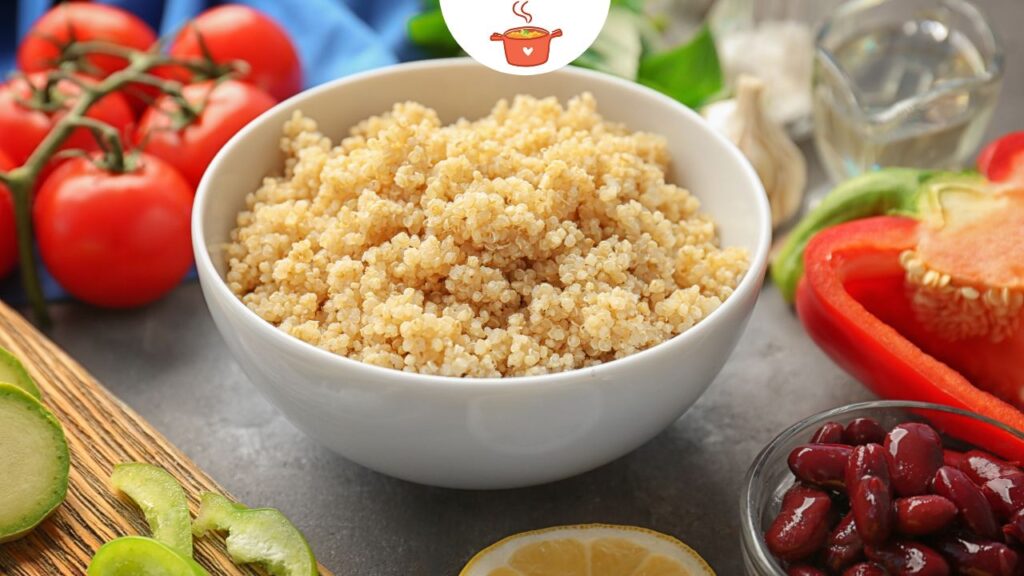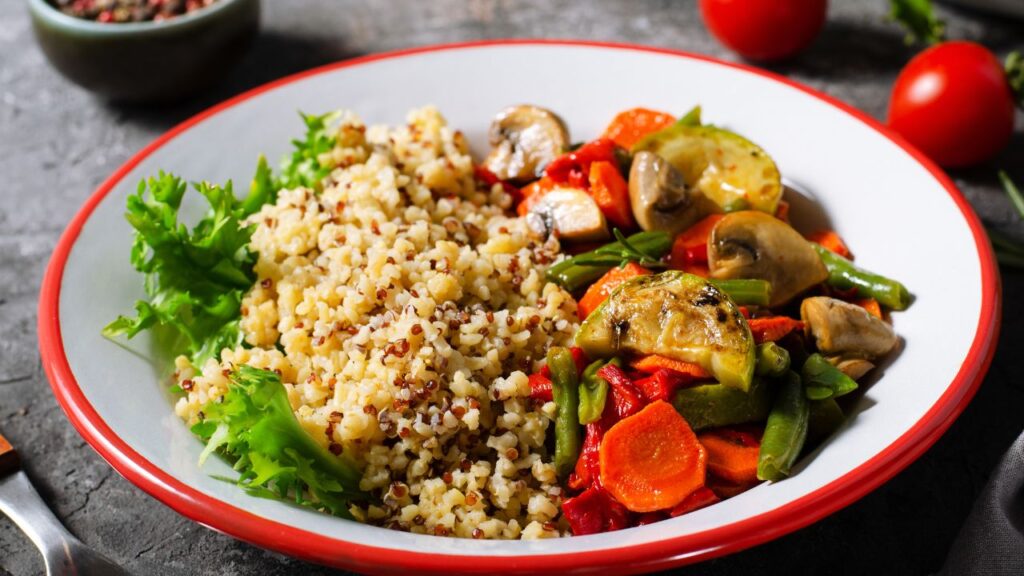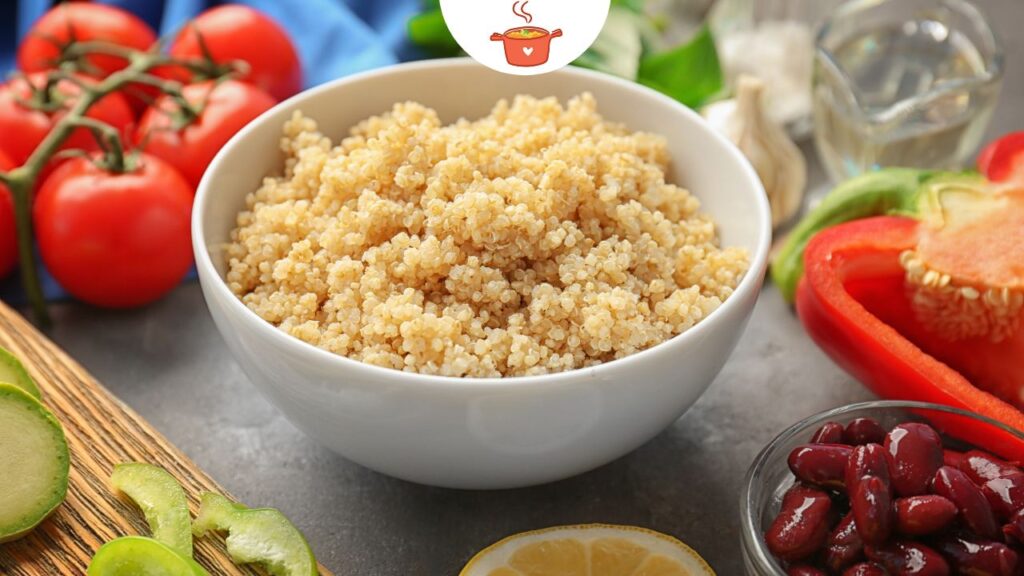
Did you know that quinoa has been a staple food for thousands of years, cherished for its incredible nutritional profile and versatility in the kitchen? How to cook quinoa with the right texture can make all the difference between a bland, mushy side dish and a fluffy, perfectly cooked grain that elevates your meals. Whether you’re new to quinoa or looking to refine your cooking skills, this ultimate guide will walk you through everything you need to achieve quinoa perfection every time.
Contents
- 1 Understanding Quinoa
- 2 Preparing Quinoa for Cooking
- 3 Cooking Methods for Perfect Quinoa Texture
- 4 Step-by-Step Guide to Cooking Quinoa with the Right Texture
- 5 Tips and Tricks for Enhancing Quinoa Texture
- 6 Common Mistakes to Avoid When Cooking Quinoa
- 7 Advanced Techniques for Perfect Quinoa
- 8 Frequently Asked Questions (FAQs)
- 9 Conclusion
Understanding Quinoa
What is Quinoa?
Quinoa, often hailed as a superfood, originates from the Andean region of South America. It has gained immense popularity worldwide due to its impressive nutritional benefits, including being a complete protein source, rich in fiber, vitamins, and minerals. Unlike many other grains, quinoa is gluten-free, making it a favorite among health-conscious individuals and those with dietary restrictions.
Types of Quinoa and Their Textures
Quinoa comes in several varieties, each with its unique texture and flavor profile:
- White Quinoa: The most common type, known for its mild flavor and fluffy texture when cooked.
- Red Quinoa: Has a nuttier taste and a slightly firmer texture, making it ideal for salads and dishes where you want distinct grains.
- Black Quinoa: Offers a rich, earthy flavor and a crunchy texture, adding visual appeal and depth to your recipes.
Different types of quinoa can affect the final texture of your dish, so choosing the right variety based on your recipe can enhance your culinary creations.
Preparing Quinoa for Cooking
Rinsing Quinoa Thoroughly
Rinsing quinoa is a crucial step that should never be skipped. Quinoa naturally has a coating of saponins, which can impart a bitter taste if not removed. To rinse quinoa properly:
- Place the quinoa in a fine-mesh strainer.
- Rinse under cold running water for about 1-2 minutes.
- Gently rub and swish the quinoa with your fingers to ensure all saponins are washed away.
- Drain well before cooking.
Soaking Quinoa: Yay or Nay?
Soaking quinoa can help reduce cooking time and improve texture, especially for varieties like red and black quinoa. Here’s how to soak quinoa properly:
- Place the rinsed quinoa in a bowl.
- Add enough water to cover it by at least an inch.
- Let it soak for 15-30 minutes.
- Drain and rinse before cooking.
While soaking is optional, it can enhance the texture and make quinoa easier to digest.
Measuring Quinoa and Water Accurately
Achieving the right quinoa-to-water ratio is essential for perfect texture. Here’s a handy table to guide you:
| Quinoa Type | Quinoa-to-Water Ratio | Resulting Texture |
|---|---|---|
| White | 1:2 | Fluffy and tender |
| Red | 1:2.5 | Slightly chewy and firm |
| Black | 1:2 | Crunchy and hearty |
Using measuring cups or a kitchen scale ensures accuracy. For more precision, especially with different quinoa types, a kitchen scale can be more reliable than volume measurements.

Cooking Methods for Perfect Quinoa Texture
Stovetop Method
The stovetop method is the most traditional way to cook quinoa, offering control over the cooking process.
Steps:
- Measure and Rinse: Measure 1 cup of quinoa and rinse thoroughly.
- Boil: In a saucepan, combine rinsed quinoa with 2 cups of water (for white quinoa). Bring to a boil.
- Simmer: Reduce heat to low, cover, and let it simmer for about 15 minutes or until all water is absorbed.
- Rest: Remove from heat and let it sit, covered, for 5 minutes.
- Fluff: Use a fork to fluff the quinoa before serving.
Tips:
- Prevent sticking by using a heavy-bottomed pan.
- Avoid lifting the lid too often to maintain steam.
Rice Cooker Method
Using a rice cooker simplifies the process, making it almost foolproof.
Steps:
- Measure and Rinse: Measure and rinse 1 cup of quinoa.
- Add to Rice Cooker: Combine rinsed quinoa with 2 cups of water or broth in the rice cooker.
- Cook: Set to the ‘white rice’ setting and let it cook.
- Fluff: Once done, let it sit for a few minutes before fluffing with a fork.
Advantages:
- Automatic shut-off ensures perfect cooking.
- Minimal monitoring required.
Instant Pot/Pressure Cooker Method
For those short on time, the Instant Pot or pressure cooker method is a speedy alternative.
Steps:
- Measure and Rinse: Measure and rinse 1 cup of quinoa.
- Add to Pressure Cooker: Combine rinsed quinoa with 1.5 cups of water or broth.
- Cook: Seal the lid and set to high pressure for 1 minute.
- Natural Release: Let the pressure release naturally for 10 minutes before opening.
- Fluff: Fluff with a fork and serve.
Tips:
- Avoid overfilling the pressure cooker.
- Adjust water ratios slightly for desired texture.
Baking Method
Baking quinoa provides a different texture and is great for integrating into baked dishes.
Steps:
- Preheat Oven: Set to 375°F (190°C).
- Mix Ingredients: In a baking dish, combine 1 cup of rinsed quinoa with 2 cups of boiling water or broth.
- Cover and Bake: Cover tightly with foil and bake for 25 minutes.
- Fluff: Remove from oven, let it sit for 5 minutes, then fluff with a fork.
Best Recipes Using Baked Quinoa:
- Quinoa casseroles
- Stuffed vegetables
- Quinoa pilafs
Step-by-Step Guide to Cooking Quinoa with the Right Texture
Measuring and Rinsing
Accurate measurement and thorough rinsing are foundational for perfect quinoa.
- Measure Correctly: Use 1 cup of quinoa to 2 cups of water for white quinoa.
- Rinse Well: Remove saponins to avoid bitterness.
Cooking Process
Bringing to a Boil, Simmering, and Resting:
- Boil: Bring the measured quinoa and water to a boil.
- Simmer: Reduce heat to low, cover, and simmer until water is absorbed.
- Rest: Let it sit covered off the heat to steam and finish cooking.
Fluffing and Serving
Fluffing quinoa is crucial for maintaining its texture.
- Use a Fork: Gently fluff with a fork to separate grains.
- Serve Immediately: For the best texture, serve quinoa right after fluffing.
Serving Suggestions:
- As a side dish
- In salads
- As a base for bowls

Tips and Tricks for Enhancing Quinoa Texture
Choosing the Right Water-to-Quinoa Ratio
The water ratio directly impacts texture. Adjust based on desired outcome:
- Fluffy Quinoa: 1:2 ratio
- Chewier Quinoa: Slightly less water
- Creamier Quinoa: More water or broth
Controlling Cooking Temperature
Maintaining a steady simmer is key to avoiding mushy quinoa.
- Start High, Then Low: Bring to a boil, then reduce to a low simmer.
- Avoid High Heat: Prevent burning and uneven cooking by keeping the heat consistent.
Letting Quinoa Rest After Cooking
Allowing quinoa to rest helps in achieving the perfect texture.
- Covered Rest: Let it sit covered off the heat for 5 minutes.
- Retain Moisture: This helps quinoa absorb any remaining moisture.
Adding Ingredients for Flavor and Texture
Enhance quinoa by incorporating various ingredients:
- Vegetables: Add sautéed veggies for texture.
- Herbs and Spices: Fresh herbs like parsley or cilantro can add brightness.
- Broth: Cooking quinoa in broth instead of water adds depth of flavor.
Common Mistakes to Avoid When Cooking Quinoa
Not Rinsing Quinoa Properly
Skipping the rinsing step can leave quinoa bitter due to residual saponins.
Solution: Always rinse quinoa under cold running water for 1-2 minutes before cooking.
Incorrect Water Ratio
Using too much or too little water can ruin the texture.
Solution: Follow the recommended quinoa-to-water ratios for your chosen cooking method.
Overcooking or Undercooking
Both extremes can lead to undesirable textures.
- Overcooked: Mushy and clumpy
- Undercooked: Hard and crunchy
Solution: Use a timer and check doneness before removing from heat.
Stirring Too Much During Cooking
Excessive stirring can break the grains and make quinoa mushy.
Solution: Stir only once or twice during cooking, if necessary.
Skipping the Resting Phase
Not allowing quinoa to rest can result in uneven moisture distribution.
Solution: Let quinoa sit covered off the heat for a few minutes after cooking.
Advanced Techniques for Perfect Quinoa
Toasting Quinoa Before Cooking
Toasting quinoa adds a nutty flavor and enhances texture.
Steps:
- Heat a dry skillet over medium heat.
- Add rinsed quinoa and toast, stirring frequently, until it turns golden brown.
- Proceed with your chosen cooking method.
Using Aromatics and Herbs
Incorporating aromatics can elevate the flavor without compromising texture.
Ideas:
- Garlic and Onion: Sauté before adding quinoa and liquid.
- Herbs: Add fresh herbs like thyme or rosemary during cooking.
Incorporating Quinoa into Different Dishes
Perfectly cooked quinoa can be the star of many dishes:
- Salads: Combine with fresh vegetables and a light dressing.
- Bowls: Use as a base for grain bowls with proteins and toppings.
- Side Dishes: Serve alongside meats or vegetables for a nutritious addition.
Recipes Highlighting Perfect Quinoa Texture:
- Mediterranean Quinoa Salad
- Quinoa and Black Bean Bowl
- Quinoa Stuffed Peppers
Frequently Asked Questions (FAQs)
1. What is the ideal water-to-quinoa ratio for the best texture?
Answer: Generally, a 2:1 water-to-quinoa ratio works best for white quinoa, resulting in fluffy and tender grains. Adjust slightly for other types, such as using 2.5 cups of water for red quinoa to achieve a slightly firmer texture.
2. How long should I rinse quinoa before cooking?
Answer: Rinse quinoa under cold running water for about 1-2 minutes to remove any bitter saponins. Make sure to rub and swish the quinoa with your fingers during rinsing for thorough cleaning.
3. Can I cook quinoa in broth instead of water for better flavor?
Answer: Yes, cooking quinoa in broth instead of water can add extra flavor and enhance the overall taste of your dish. Just substitute water with an equal amount of your favorite broth.
4. What are common mistakes that affect quinoa texture?
Answer: Common mistakes include not rinsing quinoa properly, using incorrect water ratios, overcooking or undercooking, excessive stirring, and skipping the resting phase after cooking.
5. How do different cooking methods impact quinoa texture?
Answer: Different methods like stovetop, rice cooker, pressure cooker, and baking can result in variations in texture. For example, stovetop cooking offers more control, allowing you to adjust heat and monitor the process closely, while pressure cooking is faster but requires precise timing to prevent overcooking.
Conclusion
How to cook quinoa with the right texture is a skill that can significantly enhance your culinary repertoire. By understanding the basics, choosing the right quinoa type, and following precise cooking techniques, you can achieve perfectly cooked quinoa that’s fluffy, flavorful, and versatile. Remember to rinse thoroughly, measure accurately, and avoid common pitfalls to enjoy this nutritious grain in all its glory.
Start your quinoa cooking journey today, experiment with different methods and flavors, and discover how this ancient grain can transform your meals. Share your favorite quinoa recipes, subscribe for more cooking tips, and continue exploring the wonderful world of healthy and delicious grains!

